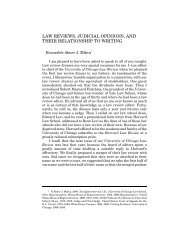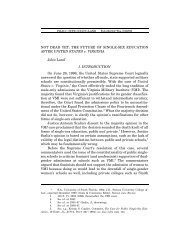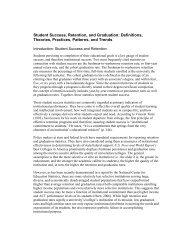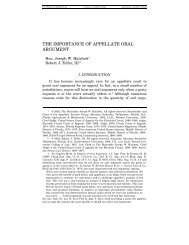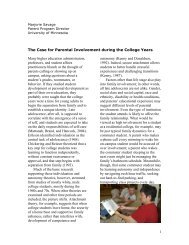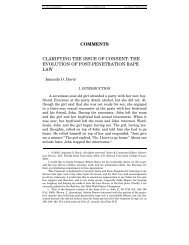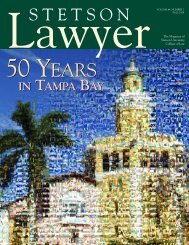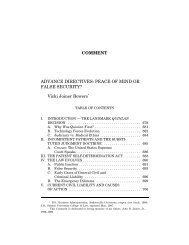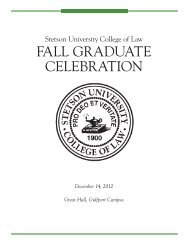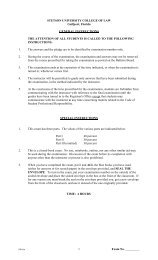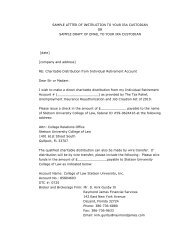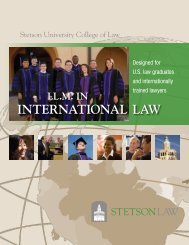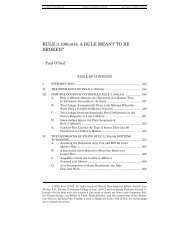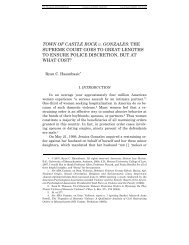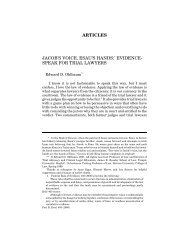Lawyer - Stetson University College of Law
Lawyer - Stetson University College of Law
Lawyer - Stetson University College of Law
Create successful ePaper yourself
Turn your PDF publications into a flip-book with our unique Google optimized e-Paper software.
Destination: Cayman Islands<br />
Thirty-two law students—including 19 from<br />
<strong>Stetson</strong>—attended <strong>Stetson</strong>’s first winter-break program in<br />
the Cayman Islands in January 2008.<br />
Co-sponsored with the American and Caribbean <strong>Law</strong><br />
Initiative, the two-week program <strong>of</strong>fered students the<br />
chance to take two credit hours <strong>of</strong> courses in International<br />
Ocean <strong>Law</strong>, Comparative Legal Systems <strong>of</strong> the Caribbean,<br />
and Offshore Tax Havens and Financial Centers.<br />
The classes were held at Cayman Islands <strong>Law</strong> School<br />
in George Town, the country’s capital city and one <strong>of</strong> the<br />
world’s premier international banking and investment<br />
centers.<br />
“We met several government <strong>of</strong>ficials, judges, queens<br />
counsel, and advocates,” said part-time student Lisa Only.<br />
“I had a great time.”<br />
Like the London semester and <strong>Stetson</strong>’s summerabroad<br />
programs, the Cayman Islands winter-break program<br />
is open to visiting students from other American Bar<br />
Association-accredited law schools.<br />
Class trip leads student to research topic<br />
Two summers ago, I enrolled in<br />
a unique course at <strong>Stetson</strong> on the<br />
“History <strong>of</strong> Civil Rights <strong>Law</strong>.” The<br />
course was exceptional because it<br />
included a directed learning component<br />
that allowed students to travel, by bus,<br />
to many cities and sites that played<br />
an important role in the Civil Rights<br />
Movement. We traveled to Atlanta,<br />
Nashville, Montgomery, Birmingham,<br />
Selma and elsewhere.<br />
Our first stop was at the Mt.<br />
Zion Baptist Church in Albany, Ga.,<br />
which now houses a small, grassroots<br />
museum. While there, we met Carol<br />
Barner Seay. In the summer <strong>of</strong> 1963,<br />
Carol was 13 years old, growing up in<br />
Americus, Ga. Despite her youth, Carol,<br />
like many other children, played an<br />
intricate role in peaceful desegregation<br />
protests and the Student Non-violent<br />
Coordinating Committee’s “fill the jails”<br />
campaign. During one such protest,<br />
Carol and many <strong>of</strong> her friends—some<br />
as young as 10—were arrested and<br />
jailed in a dilapidated Civil War era<br />
stockade in Leesburg, Ga. There were<br />
more than 30 girls in total, all held in<br />
a small, 12-by-40-foot cell, with no<br />
running water or working toilet. The<br />
girls slept on the stockade’s concrete<br />
floors. For weeks, the children suffered<br />
these conditions, without medical<br />
treatment and, for a period <strong>of</strong> time,<br />
without their parents knowing <strong>of</strong> their<br />
whereabouts.<br />
When I returned, I began<br />
researching the legal avenues for<br />
redress available for Carol and the other<br />
girls, and found that there was but<br />
one hurdle that prevented them from<br />
bringing their otherwise valid claims all<br />
these years later: expired statutes <strong>of</strong><br />
limitations.<br />
My research challenging those<br />
statutes will be published in a<br />
forthcoming article in the <strong>Stetson</strong> <strong>Law</strong><br />
Review. On March 11, the <strong>Stetson</strong><br />
<strong>Law</strong> Review and Bush Ross P.A. cosponsored<br />
a scholarship luncheon<br />
dedicated to the topic. Carol and her<br />
cousin, LuLu Westbrooks-Griffin, who<br />
was also jailed, attended the event,<br />
and we presented their story and my<br />
research. The scholarship luncheon<br />
allowed the use <strong>of</strong> storytelling to be<br />
presented as a significant aspect <strong>of</strong><br />
legal research and writing, and was<br />
an opportunity for me to share my<br />
research with my student and faculty<br />
colleagues.<br />
—Graham Shaffer<br />
S p r i n g / S u m m e r 2 0 0 8 21



